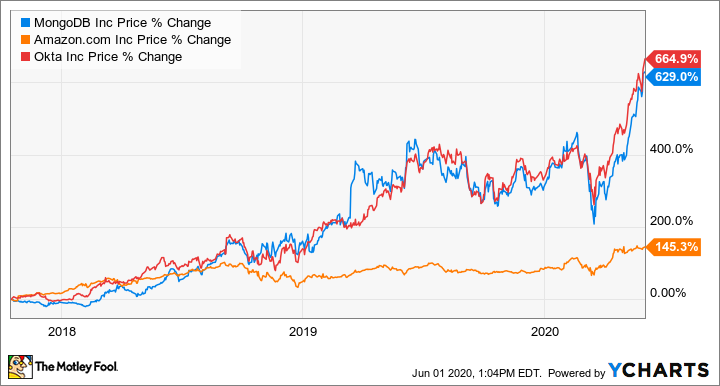Earlier this year, Okta (OKTA 1.87%), a cloud identity-management company, released its annual Businesses @ Work report highlighting the trends in cloud applications across its huge customer base. These companies are continuing to adopt cloud software at a rapid pace, it said, and on average, enterprises use 88 different cloud services; 10% of them use over 200. With such a huge number of cloud-based tools being used, how can an investor pick the winners?
It turns out that focusing on three companies that help make today's cloud software possible -- Okta, MongoDB (MDB 5.19%), and Amazon.com (AMZN -0.14%) -- is a great way to play this growing trend. Let's look at what these three bring to the table, why they have tremendous long-term potential, and how tech investors should think about becoming shareholders in these exceptional cloud computing enablers.
Okta: Securing cloud applications
As the use of cloud-based software accelerated in corporate environments, information technology organizations began to lose centralized control of their network security. To make matters worse, the trend of using remote contractors to get work done further reduced the effectiveness of a company's data center firewall.
Okta's identity management platform was developed for this exact situation and is helping companies move securely into the cloud era. As a bonus, the platform provides a convenient application dashboard for employees (and other authorized users) to access the numerous cloud software tools they use every day without having to remember all of their passwords. Its workforce and customer identity-management products have been widely adopted and continue to gain popularity.

Image source: Getty Images.
In its most recent quarter, customer count grew 28% year over year to 8,400, revenue grew 46%, and cash flow from operations reached a record $39 million. One quarter certainly doesn't make a trend, but this quarter contributes to the 44% compound annual growth rate over a four-year stretch from fiscal 2018 through the estimated $770 million to $780 million in revenue for the current fiscal year.
Okta still has plenty of growth potential, though, as it's captured less than 2% of its $55 billion addressable market.
Amazon: Hosting cloud applications
As Amazon's fulfillment business was ramping up in the early 2000s, the company needed a way to ensure developers could test new website features at scale before rolling them out to customers. An internal set of infrastructure services and developer tools was created in 2002 to meet the needs of its tech enhancement road map.
It wasn't long before senior management realized this set of services was a core strength and could be sold to external customers. In 2006, Amazon Web Services (AWS) was first released for outside customers.
Since then, this business segment has become a juggernaut in the tech space, surpassing $37 billion in trailing-12-month revenue and reaching over $10 billion in operating income over the last four quarters. As a stand-alone company, this segment would rank 87th on this year's Fortune 500 list and bump Publix Supermarkets down to 88th. AWS' most recent quarterly 33% year-over-year revenue growth shows its products and services continue to be a crucial part of the ever-growing cloud computing landscape. As a bonus, shareholders get the benefits of a market-leading e-commerce business, too.
MongoDB: Powering cloud applications
Did you know the most common databases used today are based on 50-year-old technology that was invented before the internet, cloud computing, and mobile phones? MongoDB's founders saw the opportunity to disrupt the database landscape with a superior product that's designed for today's always-on cloud-based software that you can access from anywhere.
It's become the market leader, and its products are used by 17,000 customers all over the world. The free-to-try version that allows developers to test out the product before making any financial commitments has been downloaded over 90 million times. The use of its freemium version is the primary way that it gets introduced to developers who could be potential customers.
The company's revenue growth has been epic. It's more than doubled the top line over the past two years, and annual revenue has grown sevenfold over the past four years. Management is projecting 21% annual top-line growth this year on the low end of its guidance and will continue to post a loss as it invests in growth. Investors don't mind, though: Its $422 million in annual revenue is less than 1% of the estimated $97 billion annual database spend projected for 2023. Regardless of what the stock does as a result of the company's June 4 earnings call, this database for the cloud era has plenty of growth ahead.
It could rain on the cloud investor parade
Investors should know that these exceptional operators carry a premium price tag. With tremendous stock growth over the past 17 months, valuations have risen to lofty levels.
Stock prices are from Dec. 31, 2018, to June 1, 2020. MDB data by YCharts.
MongoDB's price-to-sales ratio is a pricey 29, Okta's is even higher at 37, and Amazon's P/E is in the triple digits. Recent articles on The Motley Fool point to stretched valuations and encourage a cautious approach or even waiting for a drop before buying shares of Okta, MongoDB, or Amazon. I agree that there could be rain in the forecast for these cloud stocks, but take a different approach when looking to buy market leaders like these three.
Fool co-founder David Gardner loves to invest in excellence, and as a multidecade investor, he's seen that winners keep on winning. Waiting for great companies to go on sale could be a (lowercase) fool's errand. If you are interested in these cloud stocks, I'd buy a few shares today with the idea of building out a position over the next few years. If you do, when 2030 rolls around, your future self could be happy these cloud enablers are part of your portfolio.






